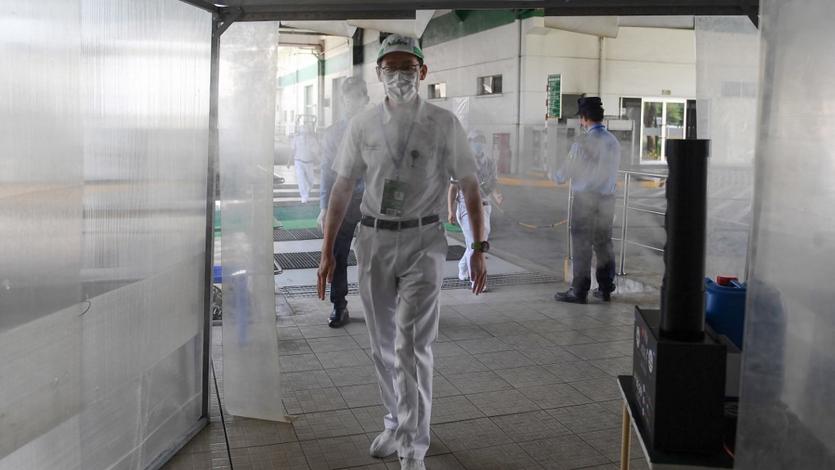 A staff of Japan' Nidec company walks through a disinfection chamber as part of pandemic measures before entering a canteen at Japanese electronic components manufacturer Nidec at the Saigon Hi-tech Park in Ho Chi Minh City on Dec 3, 2021. (NHAC NGUYEN / AFP)
A staff of Japan' Nidec company walks through a disinfection chamber as part of pandemic measures before entering a canteen at Japanese electronic components manufacturer Nidec at the Saigon Hi-tech Park in Ho Chi Minh City on Dec 3, 2021. (NHAC NGUYEN / AFP)
TOKYO - Asia's factory activity slowed in May as coronavirus COVID-19 curbs continued to disrupt supply chains and dampen demand, adding to woes for some of the region's economies that are already under strain from surging raw material costs.
Rising inflation is forcing some Asian central banks to tighten monetary policy. There's also the risk of market volatility from US interest rate hikes. Given such layers of risks, Asia's economy may remain weak for most of this year, said Toru Nishihama, chief economist at Dai-ichi Life Research Institute in Tokyo
Manufacturers slowed activity last month in countries ranging from Japan to Malaysia, business surveys showed on Wednesday, a sign of the challenge policymakers face in combatting inflation with tighter monetary policy - without crippling growth.
ALSO READ: Japan's trade gap widens as import costs surge
While COVID-19 curbs are being rolled back in some countries, they continue to weigh on confidence and demand, said Toru Nishihama, chief economist at Dai-ichi Life Research Institute in Tokyo.
"Rising inflation is forcing some Asian central banks to tighten monetary policy. There's also the risk of market volatility from US interest rate hikes. Given such layers of risks, Asia's economy may remain weak for most of this year," he added.
Japan's manufacturing activity grew at the weakest pace in three months in May and manufacturers reported a renewed rise in input costs.
The final au Jibun Bank Japan PMI fell to a seasonally adjusted 53.3 in May from the previous month's 53.5, marking the slowest pace since February.
"Both output and new orders rose at softer rates, with the latter rising at the weakest pace for eight months amid sustained supply chain disruption and raw material price hikes," said Usamah Bhatti, an economist at S&P Global Market Intelligence.
Factory activity in the Philippines also slowed to 54.1 in May from 54.3 in April, while that for Malaysia fell to 50.1 from 51.6 in April, PMI surveys showed.
ALSO READ: Supply crisis: Malaysia may cut palm oil export tax by half
In a glimmer of hope, South Korea's exports grew at a faster pace in May than a month earlier, data showed on Wednesday, because of a rise in shipments to Europe and United States.
South Korea's monthly trade data, the first to be released among major exporting economies, is considered a bellwether for global trade.


